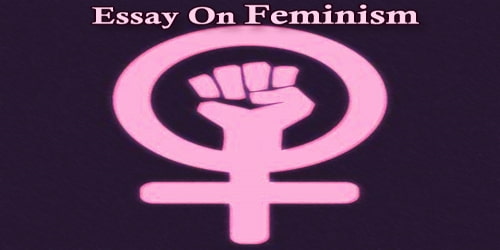Introduction: The word “Feminism” was actually used to indicate support for women’s equal, legal and political rights with men. Feminism is a philosophical doctrine or a political movement. Feminism needs to be understood as essentially concerned with the equality of women and man, and with the attempt to attain equal, legal and political rights for women.
Although largely originating in the West, feminism is manifested worldwide and is represented by various institutions committed to activity on behalf of women’s rights and interests. The term “feminism’ is derived from ‘feminismi’ a French word, which was coined by a utopian socialist named Fourier.
Women were prevented from conducting business without a male representative, be it father, brother, husband, legal agent, or even son. Married women could not exercise control over their own children without the permission of their husbands. Moreover, women had little or no access to education and were barred from most professions. In some parts of the world, such restrictions on women continue today.
History of Feminism: Throughout most of Western history, women were confined to the domestic sphere, while public life was reserved for men. In medieval Europe, women were denied the right to own property, to study, or to participate in public life.
Charles Fourier, a utopian socialist and French philosopher, is credited with having coined the word “feminism” in 1837. The words “feminism” (“feminism”) and “feminist” (“feminist”) first appeared in France and the Netherlands in 1872, Great Britain in the 1890s, and the United States in 1910. The Oxford English Dictionary lists 1852 as the year of the first appearance of “feminist” and 1895 for “feminism”.
At the end of the 19th century in France, they were still compelled to cover their heads in public, and, in parts of Germany, a husband still had the right to sell his wife. Even as late as the early 20th century, women could neither vote nor hold elective office in Europe and in most of the United States; where several territories and states granted women’s suffrage long before the federal government did so.
Aims of Feminism: Feminism was introduced in the US in 1895 as a rallying cry for women and a term of derision against them ever since. Feminism, in fact, resins too necessary to die of embarrassment, even if many have been scared away from the term. Feminism aims at individual freedom by mobilizing sex solidarity. It always aims at acknowledging diversity among women while stressing that women recognize their unity. It needs a gender consciousness for its basis, elimination prescribed gender, yet calls for elimination prescribed gender roles. It refers to any theory which sees the relationship between the sexes as one of inequality subordination, or oppression and which aims at identifying and making the remedy of the sources of that oppression.
Reactions of Feminism: Different groups of people have responded to feminism, and both men and women have been among its supporters and critics. Among American university students, for both men and women, support for feminist ideas is more common than self-identification as a feminist. The US media tends to portray feminism negatively and feminists “are less often associated with day-to-day work/leisure activities of regular women.” However, as recent research has demonstrated, as people are exposed to self-identified feminists and to discussions relating to various forms of feminism, their own self-identification with feminism increases.
Some humanists argue however that the goals of feminists and humanists largely overlap, and the distinction is only in motivation. Humanism plays a significant role in proto-feminism during the renaissance period in such that humanists made educated women a popular figure despite the challenge to the male patriarchal organization of society.
Woman’s Capability of Feminism: Woman is, as a nation being, capable of benefitting from education and of performing the duties of a citizen. Wollstonecraft’s feminism does not extend to the claim that men and women should be equal in terms of political participation, and defends a differential conception of citizenship according to which women may person properly her duties as citizens from within their home.
But if earlier feminists did not invariably find equality of roles as necessary for feminism, many modern feminists have argued that such equality is insufficient as a response to women’s oppression. Feminism involves more than a simple demand for legal and political equality; it involves the identification and removal of all aspects of women’s subordination. Some have made arguments and pointed out that the broader definition is simply a catch call.
On the contrary, it will explain the decision of feminism into separate subsections. Thus within the broad general category of feminism, we may find liberal feminists, social feminists, and many other feminists who are united to their beliefs that there is something wrong with society’s treatment of women, but who differ in their diagnosis of the problems and in their proposals for change.
The Globalization of Feminism: By the end of the 20th century, European and American feminists had begun to interact with the nascent feminist movements of Asia, Africa, and Latin America. As this happened, women in developed countries, especially intellectuals, were horrified to discover that women in some countries were required to wear veils in public or to endure forced marriage, female infanticide, widow burning, or female genital cutting (FGC). Many Western feminists soon perceived themselves as saviors of Third World women, little realizing that their perceptions of and solutions to social problems were often at odds with the real lives and concerns of women in these regions.
Still, the close of the 20th century saw women around the world advancing their interests, although often in fits and starts. More generally, and especially in the West, feminism had influenced every aspect of contemporary life, communication, and debate, from the heightened concern over sexist language to the rise of academic fields such as women’s studies and eco-feminism. Sports, divorce laws, sexual mores, organized religion all had been affected, in many parts of the world, by feminism.
Significant ways of Feminism: It is said that public-private definition is the single most important issue for feminism, and indeed that it is the end of what feminism all about. The importance of the claim is that it draws attention to the link between the two definitions of feminism. An important aspect of the contribution of feminism to political theory has been its feminist political practice.
It has been a constant feature of modern societies. As a political movement, it has engaged with politics in the conventional sense and has also widened the scope of political action in practical and theoretically significant ways. First, there are organized campaigns for particular legislative measures to secure women the vote, or to give them property rights, or to make abortion legal or equal opportunities legislation as regards employment or welfare. These campaigns have often been ignored by conventional political scientists and historians. Where they attended to, they dearly must count as political in the conventional sense; they are public interventions in the competition for the power to govern.
Second, there are organized campaigns for other non-legislative but important social changes-more women into parliament and thereby into government, more women into other powerful social positions such as in the professions and education.
Third, there are many organizations connected to the pressure of formal social change, but mostly focused on informal change, self-help organizations like a telephone line, refuges for women sufferers of violence, a network for women in particular occupations. Fourth, these organizations and campaigns are supplemented and merge into cultural organizations and sites for women’s organizations and action publishing collectives, filmmakers and theatre groups, shops, cafes, and bars.
Conclusion: Feminism is a range of social movements, political movements, and ideologies that share a common goal: to define, establish, and achieve the political, economic, personal, and social equality of the sexes. If feminism exists, the world will be a place free from chaos and confusion.
Information Sources:
















